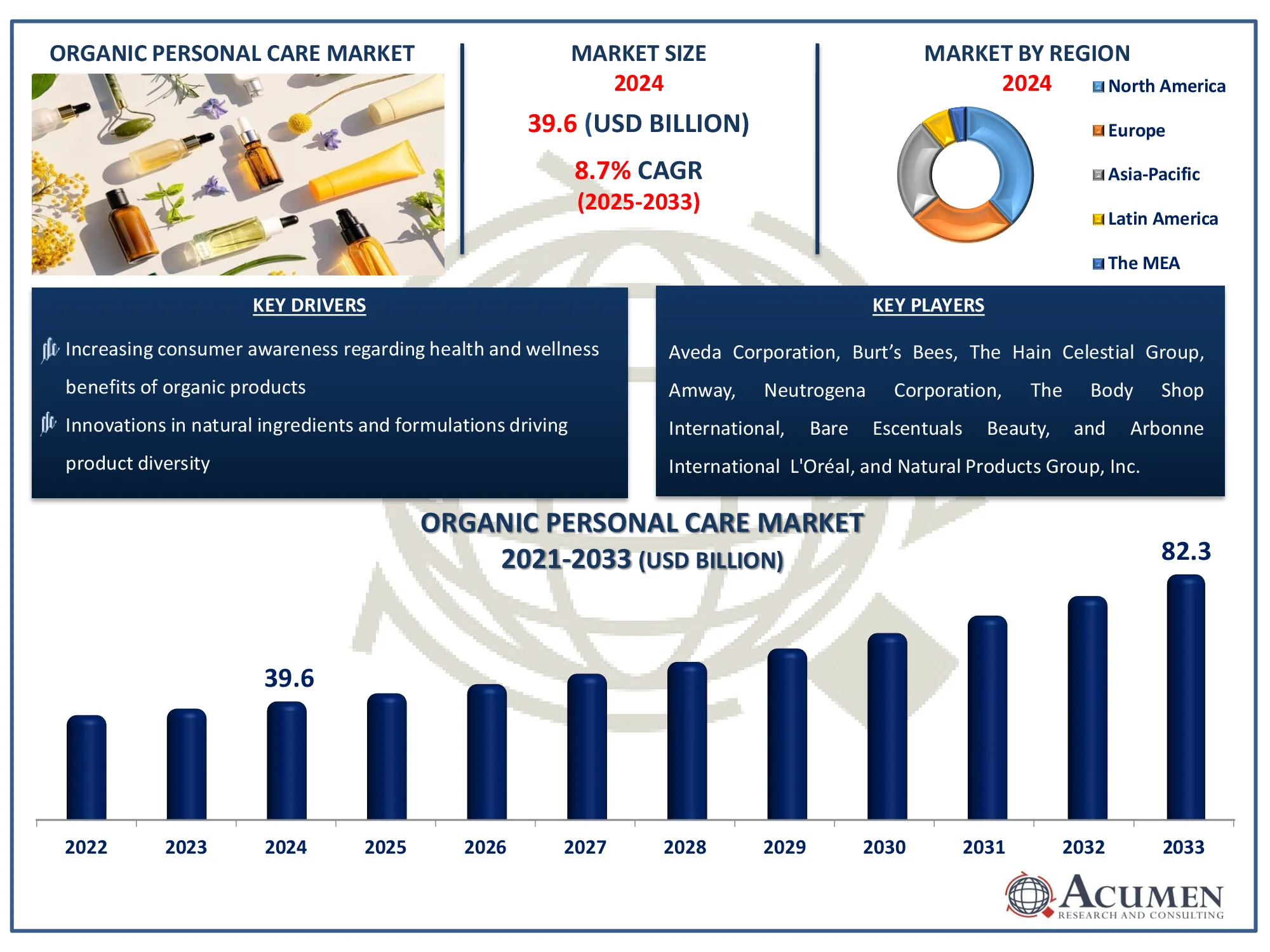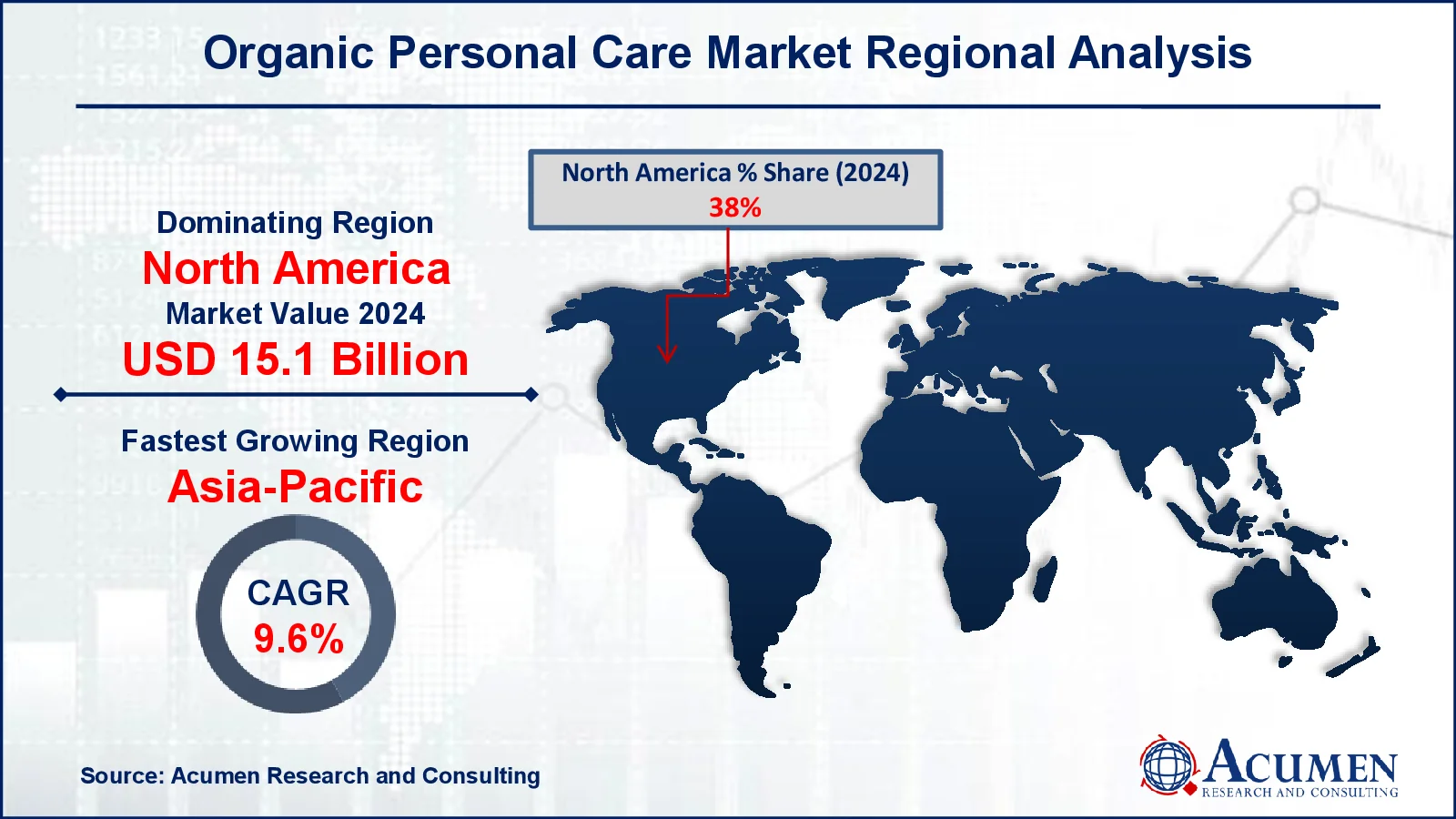September 2024
The Global Organic Personal Care Market Size accounted for USD 39.6 Billion in 2024 and is estimated to achieve a market size of USD 82.3 Billion by 2033 growing at a CAGR of 8.7% from 2025 to 2033.
The Global Organic Personal Care Market Size accounted for USD 39.6 Billion in 2024 and is estimated to achieve a market size of USD 82.3 Billion by 2033 growing at a CAGR of 8.7% from 2025 to 2033.

Organic personal care products are made from natural materials rather than synthetic substances such as parabens, sulphates, and phthalates. This industry includes skincare, haircare, cosmetics, and hygiene products that are made using plant-based extracts, essential oils, and other organic ingredients. Its rapid expansion is due to increased consumer demand for safer, more environmentally friendly options. Increased health awareness, environmental concerns, and a desire for chemical-free alternatives are driving this expansion. Advances in manufacturing methods, increased availability of organic ingredients, and growing consumer education about the benefits of natural skincare and wellbeing are all driving market expansion. The organic personal care market continues to grow on a global scale, responding to different consumer desires for holistic and eco-conscious beauty regimens as people priorities health, sustainability, and transparency in product ingredients.
|
Market |
Organic Personal Care Market |
|
Organic Personal Care Market Size 2024 |
USD 39.6 Billion |
|
Organic Personal Care Market Forecast 2033 |
USD 82.3 Billion |
|
Organic Personal Care Market CAGR During 2025 - 2033 |
8.7% |
|
Organic Personal Care Market Analysis Period |
2021 - 2033 |
|
Organic Personal Care Market Base Year |
2024 |
|
Organic Personal Care Market Forecast Data |
2025 - 2033 |
|
Segments Covered |
By Product Type, By Distribution Channel, and By Geography |
|
Regional Scope |
North America, Europe, Asia Pacific, Latin America, and Middle East & Africa |
|
Key Companies Profiled Aviation |
Aveda Corporation, Burt’s Bees, The Hain Celestial Group, The Estee Lauder Companies Inc., Amway Corporation, Neutrogena Corporation, The Body Shop International PLC, Bare Escentuals Beauty, Inc., Arbonne International LLC, Natural Products Group, Inc., L'Oréal S.A., and Yves Rocher SA. |
|
Report Coverage |
Market Trends, Drivers, Restraints, Competitive Analysis, Player Profiling, Covid-19 Analysis, Regulation Analysis |
A few major drivers drive the organic personal care market. For starters, people nowadays are more conscious of their health and actively seek products that support their wellness objectives. As a result, demand for organic alternatives has increased as people seek safer alternatives devoid of potentially dangerous chemicals frequently found in traditional personal care items. Furthermore, the global trend towards sustainability and environmental consciousness has had a huge impact on this sector. Consumers are becoming more conscious of the environmental impact of their purchases. They choose eco-friendly and sustainably sourced products derived from natural components, which is fueling the expansion of organic personal care items.
Nonetheless, despite its expansion, the market confronts hurdles. Organic components have greater production costs, which occasionally results in higher-priced end goods. Furthermore, when compared to synthetic counterparts, these natural formulations may have shorter shelf life and stability difficulties, causing logistical challenges for makers and merchants.
On the other hand, there are several prospects in this industry. As more consumers in these regions priorities organic and natural products, emerging economies offer unexplored opportunity. Collaboration between companies and merchants can increase the awareness and accessibility of organic personal care items, especially as online shopping becomes more popular.
Furthermore, innovation is essential. Constant research and development in natural substances and formulations opens the door to hybrid solutions that combine the benefits of natural materials with technological breakthroughs, boosting efficacy without compromising organic principles. The organic personal care market, in essence, thrives on increased consumer awareness, environmental conscience, innovation, and collaboration. Its evolution and expansion are being pushed by a common demand for safer, more sustainable and more nature-aligned personal care solutions.
The worldwide market for organic personal care is split based on product type, distribution channel, and geography.
According to the organic personal care industry analysis, the increased emphasis on skin health and attractiveness has made skincare the market's most important component. Consumers value natural remedies for a wide range of skin concerns, from anti-aging to specific illnesses such as acne or sensitivity. Incorporating organic ingredients, such as plant extracts, into a wide range of skincare products, including cleansers, moisturizers, and serums, maintains its dominance. According to industry statistics, this market will continue to grow as customers seek safer, more natural options, with a steady rise projected in the coming years.
Hair care is the second-largest segment, as one might expect. Its near-parallel position stems from a growing awareness of synthetic chemical impacts on hair health. Consumers are increasingly looking for natural alternatives to nourish and restore their hair, addressing issues like damage repair, scalp health, and overall hair wellness. The expanding market for organic shampoos, conditioners, and styling products is consistent with this trend, with industry projections indicating that the organic hair care category will rise consistently in the organic personal care market forecast period.
The hypermarket/supermarket segment dominates the organic personal care market because to its widespread physical presence and established consumer trust. These retail behemoths leverage their enormous networks and smart locations to appeal to a diverse client base looking for organic items. Their in-store displays, promos, and specific sections for organic personal care items appeal to purchasers looking for convenience and variety, resulting in a tactile shopping experience that aligns with many consumers' preferences. Market data predicts that this market will continue to grow, backed by increasing demand for organic choices, with sales expected to rise steadily in the next years.
Following closely, pharmacy and drug stores secure the second-largest share. These outlets benefit from their reputation as health and wellness hubs, frequented by customers seeking reliable guidance on organic personal care products. Pharmacy chains curate a limited selection of these things, leveraging their authority to promote health-conscious choices and assist customers in finding specific organic solutions advised by healthcare specialists. Market estimates indicate that sales in the organic personal care area will continue to rise.
North America
Europe
Asia-Pacific
Latin America
The Middle East & Africa

North America leads the organic personal care market across all regions for a variety of reasons. The region has seen strong demand for organic products as its mature customer base priorities health and wellness. Consumers in this region have a strong preference for clean beauty and natural cures, which is supporting the domination of organic personal care. Furthermore, a well-established distribution network and heightened knowledge about the possible dangers of synthetic chemicals contribute to North America's market supremacy.
In contrast, the Asia-Pacific region emerges as the organic personal care market's fastest-growing sector. A growing middle-class population, increased disposable incomes, and an expanding consumer mindset towards healthier lifestyle choices are driving this expansion. Increased knowledge, urbanization, and the influence of social media in promoting wellness trends are driving up demand for organic personal care products in countries such as India, China, and Japan.
Furthermore, the Asia-Pacific market has a long heritage of natural medicines, which encourages the adoption of organic skincare and beauty rituals that are strongly based in ancient practises. The vibrant e-commerce sector of the region has also made a huge contribution, making these products more accessible and affordable to a wider audience. According to market research, the Asia-Pacific area will experience continuous growth as a result of changing consumer preferences, expanded distribution channels, and a growing emphasis on sustainable living. This area is likely to play an increasingly important part in the global market landscape as it continues to adopt organic personal care.
Some of the top organic personal care companies offered in our report includes Aveda Corporation, Burt’s Bees, The Hain Celestial Group, The Estee Lauder Companies Inc., Amway Corporation, Neutrogena Corporation, The Body Shop International PLC, Bare Escentuals Beauty, Inc., Arbonne International LLC, Natural Products Group, Inc., L'Oréal S.A., and Yves Rocher SA.
Looking for discounts, bulk pricing, or custom solutions? Contact us today at sales@acumenresearchandconsulting.com
September 2024
April 2025
January 2021
May 2024